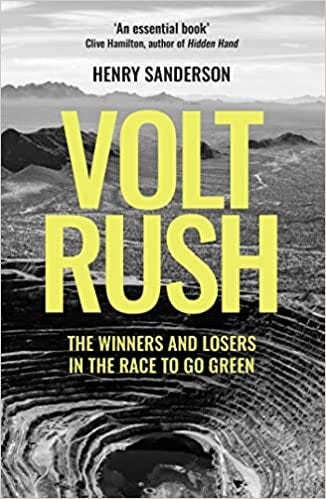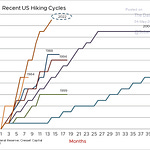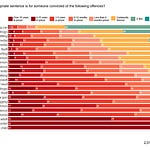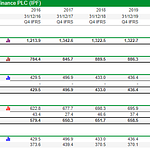Today I’m kicking off a new feature – a regular series of in-depth interviews around a diverse range of topics with ‘experts’ in the know. I promise it won’t be the usual fund manager interviews, more a look at a key strategic area for investors to focus on. To start with we’ll be looking at the whole battery space – and the dominance of the Chinese in this fast-growing global industry.
A week ago, I interviewed Henry Sanderson who has just published an excellent book called Volt Rush, the Winners and Losers in the Race to Go Green, which is out in July in the UK, and September in the US. You can pre-order here: http://bit.ly/385q6Pe
I’ve already run a review of the book in my Citywire column, HERE, but my conversation with Henry is absolutely worth listening to - just click on the link ABOVE!
Lightly edited, automated transcription
David Stevenson 00:00:02 Welcome to the Adventurous Investor in conversation. I'm delighted to have Henry Sanderson with me today. He's got a fantastic new book out called Vault Rush, the winners and losers in the race to go green, highly recommend it. Henry welcome.
Henry Sanderson 00:00:17 Thanks for having me on,
David Stevenson 00:00:20 Henry. I'm going to sort of go through some of the chapters and look at the chapters, but I just want to ask you a kind of big $64 trillion question first. it comes in two parts really. we've got this energy transition on its way. we are all going to be using a lot more, electrified power. Yes, we're probably going to be using a hell of a lot more batteries unless the other technology comes along. but I suppose this open, this leads opened the question, whether or not, a, we are going to be able to make the transition just a demand for batteries and all the raw materials that go into batteries over the next 10, 20 years, just going to increase so much versus our processing power, refining capacity, minding capacity. It that we might not actually have enough materials to make the transition. And even if we do, it's effectively, the Chinese have really got it sewn up. Haven't they?
Henry Sanderson 00:01:13 Yes, Good question. I think we can make the transition, but there's a couple of risks coming out at the moment that suggests that we need to invest, heavily in this supply chain. And this is why I wrote the book, which is that let's not just obsess about Tesla and, electro vehicles. Let's be aware of this whole supply chain, open our eyes to what's going on so that we can bring forth the investment, that's needed, especially in Europe and the us. So, I'm not saying that this transition can't happen, you know, there's probably enough raw materials in the Earth's crust. Yes, But what we need to do is to, to invest and to mobilize resources. And what we're seeing now is that raw mature prices, especially for lithium have gone up a lot, which is increasing, battery prices, which is increasing the cost of electric vehicles.
Henry Sanderson 00:02:02 But what we want is for electric vehicles to go to go down in price. Yes, we’re at great risk now of seeing EV prices go up, and internal combustion engine, car prices go up and people might just keep their old, most polluting car for longer. Right. So, it's the worst possible situation. So, we need to get battery prices down. but that, that involves being aware of the supply chain and the investment needs. and it's not a question anymore of saying, oh, China will do it. let's let someone else do it. No, we need to do it and we need to do it now. That's the sort of message, of my book.
David Stevenson 00:02:37 I suppose that the narrow question is if looking at the current processing capacity and the refining capacity and the gigafactories being planned we'll come back to them in a minute. Yes, I suppose I just want to keep pressure. It, it, at the current capacity that we've got, we've we, what kind of concept do we need to increase from where we are now? Are we talking kind of like, you know, over the next 10, 30 years, we've got to do a gentle doubling, or are we talking quite a big con quantum? We’ve got to increase investment across the piece by five tenfold.
Henry Sanderson 00:03:10 Yes. So, I mean, if you look at the Gigafactory, investments, you know, we saw about $150 billion, I think pledged and gigafactories, last year, so on the sort of battery plant side, at least from the announcements, and especially announcements in China, it looks like, you know, we're on track, right. You know, obviously, that might, the pledgers need to be converted into, into hard, cash, but it it's smaller markets like, you know, like lithium where, where the challenges are, you know, lithium market, you know, Lithium demands growing in around 25% to 30% a year. demand will double by 2030. So that's the sort of, bottleneck, that we're seeing, but it, but these numbers, you know, obscure another fact, which is we need to build low carbon, supply chains. That's another issue. Yes, And also, we've got this big geopolitical shift going on at the moment, right.
Henry Sanderson 00:04:06 Where, you know, we're talking about decoupling from China, we're talking about, you know, what, I think one, one investment bank or globalization, you know, slowing down of globalization. Right. And, the west is, it's interesting because they're saying, we want to build a separate supply chain from China. We don't rely on China before the west has actually begun to build its own supply chain. So, we're saying to Chinese, we don't want to rely on you. Meanwhile, give us more batteries and give us more, Lithia. Yes, so yeah, you know, it's, it's this complicated number of factors, you know, where we need a sort of Western supply chain, a low carbon supply chain. you know, so it's not a simple matter of looking at total numbers.
David Stevenson 00:04:51 Okay. So, let's just, let's move, move piece by piece. Let's talk about lithium first. I suppose most people, when they think about lithium hey think it comes well. I suppose it comes out of the ground, but quite often it comes via different ways. There are different ways of getting lithium. now most of that, if you talk to anybody that's passing interest assumes it all comes from Chile. now there are other sources of lithium around the planet. is that, is, is that a supply chain bottleneck there that effectively we are all reliant upon a small number of output from, from chili and a couple of, I think there's a couple of minds elsewhere around the world. Is that the wrong picture?
Henry Sanderson 00:05:33 No. So what's happened is, Chile has actually lost its dominance, in lithium that it had and Australia, has come to the four as, as the largest producer of lithium. But the problem is that all this lithium is sent to China to be yes, to be processed. and also it's a much higher carbon footprint than, than that in Chile. so what we're seeing now is a lot of investment in, in new countries. Argentina is one, Africa's another, another area and also in China domestically. So the market is highly concentrated at the moment because you've got, Chi and then you've got Australia, China who are sort of linked, like in iron or right. It's linked. so, so the problem is, is that we need new lithium sources, but we also need new lithium processing, outside China. And, and that's a fundamental bottleneck because it's probably going to be more expensive. and it's going to take longer to build that refining and processing outside, outside China. So the lithium market is, diversifying, you know, those,
David Stevenson 00:06:35 To what degree are the Chinese dominant in processing?
Henry Sanderson 00:06:41 Yes they are very dominant, you know, they're, they're really highly dominant. Almost all lithium processing and for other minerals as well, happen happens in China. and interestingly we've seen, processing come on in Australia, but it's taken longer than expected and it's been more, more, more expensive than forecast. and this week, a US producer album says it's going to build a processing plant in the US and there are plans, to build by Northvolt to build one in Europe, you know, so stuff's happening. But I think, you know, we got to come terms with this notion of green inflation, right. Things that we want to, if we want to reassure, is going to probably cost more, right. We're not going to do things at the same cost the Chinese do. So that's also a sort of risk to the supply chain.
David Stevenson 00:07:35 and I suppose one of the issues which people don't like talking about, but if they bring in onshore lithium processing, I imagine it's probably quite polluting correct me if I'm wrong. and it's probably quite industrial and therefore a lot of people, you know, won't like having lithium processing plants turn up in their backyard.
Henry Sanderson 00:07:56 Well, I think, yeah, this, this is a question, you know, in, in China it has traditionally been, that way, you know, when I visited, you know, one plant in China, you know, has been powered by coal. you know, obviously, that's, that's, that's not very pleasant. it looks like a typical sort of Chinese, industrial plan. Yes, Whether you could build that, you know, right. Bang in the middle of the home counties or whatever, I'm not sure, but the advantage of starting from scratch, in Australia and Europe is you could build something a bit, a bit cleaner. and you know, that's what, that's what companies like Northvolt, which I said want to build, you know, Europe's largest lithium plant. They say it's going to be sustainable powered by, you know, renewable energy. So we can imagine, a better sort of model, going forward.
Henry Sanderson 00:08:48 But I think for, for the west, the real problem is on, on the mining side. you're right. Like in the US, there's a lot of opposition to mining, right. And you've got this fundamental conflict, which is that lots of communities don't want mines. and president by has said, we want mining, but only if it's super sustainable, and respects, you know, native, native rights native lands. So, you know, it's very tricky to build a mine, in the west, especially in the US and, and Europe now. So that's, that's, that's a fundamental issue.
David Stevenson 00:09:22 We'll come back to Cornwall in a minute. Yeah, Yes,
David Stevenson 00:09:25 We could do it in Cornwall. then I suppose we move up the value chain. We go past lithium when we go to the batteries themselves. Yes, And I think it's, it's worth dis emphasizing how many of them are made in China. so for full disclosure, I'm a non-exec director of Gresham house, energy storage. We buy batteries quite a lot of our batteries come from China. We're not unique. and, you know, there are quite big Chinese companies who are the big players in the, in the battery market at the moment.
Henry Sanderson 00:09:56 Yes, It's, it's a fascinating story because, you know, you look at the lithium iron battery history, you know, it's a chemistry that was, you know, really invented in Oxford. the Japanese sort of commercialized it, which is a huge important step. and then the Chinese, in the late nineties kind of got into this market and it was part of that globalization story where it shifted to the lowest cost, cheapest labor market, right. And China ended up producing batteries for mobile phones, you know, the iPhone came along MP3 players. And then, you know, when, when China became serious about EVs, these companies moved up the value chain. And so now you've got B I D and, and CTL two big battery producers. If you look at their histories, they both started really, making mobile phone batteries, back in the day.
Henry Sanderson 00:10:48 And now they're making big electric fill back vehicle batteries and, and their leaders, in the field. But not only that we see other Chinese companies coming very quickly up, up behind them. you know, and, and these, these Chinese battery companies are keen to expand overseas. so you've got CATL, which is the world's biggest battery company. it's, it's got a plant in Germany. It's opening a plant in Germany, this week, another one, TM, Goran GRAT, high tech, it's building a plant in Germany and it wants to have a third of its capacity overseas by 2025. So you've got these big, well capitalized Chinese companies, you know, dominating the Chinese market and coming overseas as well. So
David Stevenson 00:11:36 Is there, is there any country apart? I mean, south, Korea's got a quite, vibrant battery market and the China Japanese did as well, is it, or was it really just a dominant Chinese game?
Henry Sanderson 00:11:48 No, you're exactly right. I mean, China producers around 79% of battery cells today, it'll go down to about 70% by 2030 ish. That's, that's what we forecast, benchmark mineral intelligence. but you're right. You've got, LG, of, of South Korea spun off its battery arm listed on the stock exchange. It's, it's moving fast, it's raising, you know, it's raised capital it's, it's moving quickly. you're right. You've got other south Korean, companies. You've got Panasonic of Japan, obviously a long time, Tesla supplier, but, but still, as I said, China's like 70% of, of the market. And I, I think, you know, the issue is that the Chinese players, you know, they can build gigafactories cheaper than, you know, what we're seeing, in the US and Europe and, and, and, and east Asia actually is, is very expensive in terms of gigafactories much more expensive. So the Chinese have got the, the cost down and, and the scale, obviously the bigger a factory, the cheaper it is. So, you know, I'm not saying, you know, we're not saying they're going to dominate all the market, but it's going to be tough competition
David Stevenson 00:12:59 Just as a left field question, just following on for that Chinese issue. We've seen with Russia, how, when you do an economic break, it can be quite, you know, it can be quite a break. Yes, I mean, for our sake, let's just say China did invade Taiwan. We all hope it doesn't happen. Could the west actually say, well, you know what, we're just not going to trade with China, particularly around batteries. Would we basically shoot ourselves with the foot?
Henry Sanderson 00:13:26 Yeah, I think, you know, it's an interesting question. I, I, I think, you know, Russia's nothing like the economy that China is no, I mean, there's just no, no comparison, right? Obviously, Russia's big in oil, but you know, is not big in, in clean energy technologies or, or these things. So, you know, China is a different ball game, but, you know, what's also interesting is China has really gained out of globalization. And, and in this book, you know, what's interesting is a lot of these companies were supported by, by the west, right. And if you look at C a TL world's biggest battery company, there was BMW that got them first to produce electric vehicle batteries, BMW that bought the first orders that created this, this giant, right. And, and Western capital has supported a lot of these Chinese companies. So, you know, China has a big, has done well out of globalization and has a big, interest I would say, in, in, in this system.
Henry Sanderson 00:14:21 So, you know, surely any calculation of, of theirs over Taiwan is going to take, take that into consideration. They're looking at what's happened with Russia and Ukraine, very, very closely. you know, you can bet on that. I mean, they, they are stressing more self-reliance, more, you know, relying on themselves, but I just don't, you know, I just don't see it. I, I see that they've been great beneficiaries of, of what's going on. And as I say, these companies want to expand in, in foreign markets. So do they want to completely upset the relationship? I don't probably don't think so. Especially not with Europe.
David Stevenson 00:14:55 You also hear people talk about alternative battery technologies. When I talk to people in the industry they are not convinced about the alternative battery technologies, at least not at scale anyway. Yes, what's your view on the, there are all you talk to every lots of scientists and they always go, I've got my latest technology, solid stake batteries, all sorts, you know, a million, there are 1,000,001 different ideas out there. Are any of them even close to being commercially scalable?
Henry Sanderson 00:15:24 Yes, So I think it's interesting because you've got a lot of startups, you know, with new technologies, but I think the big players are not standing still. Right. And people like C a TL, LG, you know, they have big R and D teams they're working on, on new chemistries. So, you know, I wouldn't put it past them to commercialize some of these new chemistries. And I think what we're seeing is, CATL talked about sodium iron they're, they're trying to commercialize that, I think next year, so, right. That's sort of from out of nowhere to commercialization, it takes a big battery company to do it. Right. Yes, And I put my money on them, doing it. And then we're seeing, you know, solid-state we're seeing, we're getting semi-solid state first, and then we'll probably move to solid-state, by the end of the decade. but again, the question is, is it going to be these small startups doing it? Or the, or the big battery companies who already have internal R and D you know, so then you
David Stevenson 00:16:21 Put your money on the big guys.
Henry Sanderson 00:16:23 That's a tricky one but Yes, So are the, there are these new chemistries coming down, down the pipe. but the thing is they have to, you know, they have to reach scale. they also have to have their own supply chains built up, you know, solid state, you know, if you replace the liquid electrolyte with something else, you know, what's that supply chain look like for that material? Is it low cost? You know, is it available, et cetera, et cetera. So you might replace one raw material, but you, you might replace it with another, that has a, a different supply chain. so scaling up is like the fundamental issue, right? Yes, We're talking about, we need to reduce emissions from the transportation sector, which is vast, right. Which is just massive. So to make any difference, you know, these new technologies need to be scaled up, quickly. And Yes, Also find a point about technology, which is one of the most brilliant, or one of the most effective technologies is these LFP batteries, which is actually reviving an old technology, an old battery chemistry, right? So that's the sort of fascinating example of through engineering work engineering tweaks. you can really make an old technology work better. So it's not always a case of, you know, a scientist in a lab being Eureka found amazing new chemistry. Maybe it's an engineering, problem as well.
David Stevenson 00:17:47 ’s look at the other minerals metals used in the processes. let's bring to come to cobalt. Cobalt's always got a, a kind of spotty history, literally instantly talks about the de the democratic Republic of Congo, and all those, all those cobalt minors. Can we have a kind of guilt-free cobalt?
Henry Sanderson 00:18:09 Yeah, it's a good question. I'd say, yes, we can. I mean, you have, so you have a lot of this informal mining, in the DRC, which is not regulated, you know, can include child labour, bad safety standards, but at the same time you have, big mining companies there. You know, Glencore being one, China, Molly, which is a Chinese minor being another, there are a few others, right. And when you go there, these, these big mines are behind massive, security gates. They're really like, cities under themselves, they have perimeter guards, you know, so within that could be a mine in, in, in any country. Right. And, and the question is, the problem has been, that sometimes the informal mine is break into, or often they do break into the mining, sites and, and mine on the big mines, you know, and then you have this issue where, you know, if they, if there's an accident, which is what happened on the clinical site, you know, then it, then it's sort of mixing the two worlds in a way.
Henry Sanderson 00:19:16 And that, and that means that if a car company said, I want to source cobalt from this one, mine, I want to guarantee it's, not touched in formal minds. And that, then that becomes a problem. So it is possible, but that you have these sorts of complications. but you know, what we're seeing now is auto companies are auditing and visiting their minds more than ever before. you know, like Tesla's visiting the mines now frequently to see what's going on. So, you know, there is much more awareness of, of what's going on. And on the other hand, the DRC government wants to clear, clean up this informal sector and try to regulate it, huge challenge, but there's, there's sort of change happening.
David Stevenson 00:19:55 And are there any other countries that could produce enough cobalt? We talked about Australia with lithium. Anybody could rival DRC in, in cobalt.
Henry Sanderson 00:20:02 Yes, So it is interesting because in Indonesia, which, I talk about in the book is obviously a big nickel producer that nickel also comes okay. Cobalt. So there's cobalt, supply from Indonesia. so that's actually going to come, come to market Australia. as you mentioned, as well,
David Stevenson 00:20:21 Glencore, you just mentioned them, I suppose, if what were to sit down and look at the kind of key players in this revolution, obviously, Tesla, everybody talks about Tesla in the west, sorry. In the west, everybody talks about Tesla, Glencore. Call's had a pretty powerful position, isn't it? it's got a lot of, it's got quite a few of the minerals and metals that we need. Yes,
Henry Sanderson 00:20:41 Yes, It's a fascinating story. Glencore because you know, it is gone from a company with, you know, that, you know, it's obviously a big coal producer. Yes, Commodity trader has gone from a company with quite an interesting, background to one now that's that is, and is, and wants to be even more at the heart of sort of this electric vehicle supply chain. So you have this fascinating, transition, because they're big, you know, biggest producer of cobalt, big producers of, nickel. And they're also many people don't know, they also recycle, a lot of materials. So, you know, they're, they're deeply involved. They have, supply agreements with, with Tesla. you know, and, and I remember one of them telling me that, you know, they want become Tesla's procurement arm, you know, that's the ambition. So they've transitioned from, you know, to, to a company being at the heart of the EV supply chain they've, they've pledged to sort of cap their, coal production. obviously, they're making lots of money out of coal. but the question really for them is all about what, how they're going to expand. Right. You know, how they're going to expand nickel, these other things to, to capitalize on their position.
David Stevenson 00:21:50 You just mentioned nickel which is a nice segue. Nickel is underestimated metal that's used in the whole energy transition. I don't how important is I indeed easier to it because obviously we know about nickel and Russia, which is less said the better I suspect, but Indonesia is, is quite a big player. Isn't it? I mean, how important
Henry Sanderson 00:22:11 Central Indonesia's going to provide most of the supply growth this decade for nickel and it's becoming the hotspot, the centre, for nickel for, for EVs. and that's because it's got, you know, it's got the biggest, resources. but the problem is just the, the sort of environmental, footprint of the nickel. And it's fascinating because Indonesia has become a sort of nickel colony of China. And what happened was, Indonesia to their credit said, well, we don't want a to just be exporting, raw nickel law. You know, we want to become a value-add processing, centre. So, so they, they banned, you know, exports of raw nickel law and the Chinese answered the, you know, answered the call wholeheartedly and they invested in massive and, you know, industrial parks and nickel processing, in Indonesia.
Henry Sanderson 00:23:04 but at the same time, coal power 60% of Indonesia's electricity grid. and these are super energy-intense projects. so you've got a huge, sort of dilemma, which is the nickel's going to come from Indonesia, but how do you clean it up? Car makers just face no choice, but to, to go to Indonesia, to get their nickel. And I think we're going to see Tesla and others will have to go to Indonesia to, to secure nickel. We've seen, Volkswagen agree to do a deal to, to invest in nickel in Indonesia, alongside Chinese companies. So, you know, I think it's a huge problem, you know, that's where the nickel is, but you got to somehow clean it up. And is that possible? you know, my book's all about consumers being aware of the supply chain so that we can try and, you know, put pressure, try to try to make it better supply chain. So let let's see what happens.
David Stevenson 00:24:04 what about Cornwall - there is a bit of a Renaissance of Cornish mining, thank God. a great industry, which was humbled a couple of decades ago. Do you think it's realistic that we could get some of the lithium or some of these, some of this stuff from, from Coldwell?
Henry Sanderson 00:24:26 Yeah, I do. I mean, you know, it's interesting what's going on at the moment, because with these high lithium prices, I think I said at the beginning that the, China, is, is turning to its own domestic resources. China is not a huge produce of lithium domestically. They import a lot from Australia as I said. but with these high prices, they're turning to sort of lower grade resources in China. So why, why don't we look in the UK to see what we have? there's no reason why we can't, produce lithium and Cornwall has this, as you say, like thousands of years of mining history, it's not necessarily, a community or an area that's hostile to mining. Yes, you know, let's try and have a look what we have and I'm not saying we're going to be the next Australia or, you know, big producer, but you know, we can produce, let's see what we can produce. Right. And, and at these high prices, why not? Why not, why not give it a go. and I think there's also new tech technologies, that can be tried. You know, Cornwell has lots of geothermal. Yes, so you can, you know, generate geothermal electricity and get lithium that's what they're trying in other places in the world. So I'd say, you know, let, let's try it. Why not?
David Stevenson 00:25:43 just sticking with Western Europe on a bigger scale, we are seeing excited talk of gigafactories everywhere. North fault. You've mentioned. Yes. Which Sweden isn't it. but there's also British fault and yeah, sure, sure. There'll soon be an Irish fault Welsh fault and Scottish fault. Yes, Yes, So, I, is this all a bit late ?
Henry Sanderson 00:26:09 Yes, So I think it is late. I think the UK faces a real issue, which is that it is late and we risk losing our auto industry because we have this deal with the EU where, you know, certain amount of, components have to be made in the UK, before they're exported. So I think it is late, but we are seeing, you know, companies like BritishVolt are doing all they can, right. And they're moving fast to, to build, envision, which is a Chinese company, took over the N Nissan battery factory in the UK. I think that's the only Gigafactory there, they're planning a big expansion. so, you know, that's promising, they're a big, big world, capitalized, company and, and British world looks, looks very promising as well, but you did see, the climate change committee, warm this week that, you know, the UK, needed way more gigafactories, to, to meet, to meet the demand. and I think they're saying, you know, 140 gig hours, by 2030. so you know, those big expansion needed to come.
David Stevenson 00:27:16 The last couple of questions.On recycling, I think this is fascinating, isn't it? You know, we, we can't really just carry on endlessly mining, planet earth. And at some point you do start run out stuff. I mean, we're probably a long way away from that yet in most of the, the metals and minerals are talking a bit about, but recycling could be a huge bit of this industry. Couldn't it?
Henry Sanderson 00:27:42 Yes, So recycling, I think, is going to be, you know, very promising and potentially by, by, by mid-century, you know, you could see a situation where reliance on mining is considerably reduced, right. But in the near term, you're going to need mining. So recycling isn't panacea, you know, you see politicians saying, oh, we'll focus on recycling. It is not, it's not going to solve all the problems you're going to need mining. but recycling is, is, is gearing up, you know, especially in China, you know, and they're getting, they're starting to get sort of meaningful volumes, back. So I think there's, there's huge potential for, for recycling. But part of the problem, for Europe is, you know, traditionally a lot of, old cars used to get exported to Ukraine or other countries, right. So if EVs might last much longer than we think, right. So the question is, how do you get that battery back, at the end of life, right? To, to be recycled, that that's the issue, you know, how, how are we going to set up this system, to work? but pretty
David Stevenson 00:28:55 Is there anyone, is there anyone really, blazing a trail there?
Henry Sanderson 00:28:59 Yes, as I say, I think China again on recycling is, is pretty far ahead. you know, they've, they've got big facilities, they've got, collection, collection points, et cetera, but you know, we're seeing, you know, Europe, you've got Unicom, you know, NorthVolt has pledged to use a very high percentage of recycled materials in its batteries and in America. I talk about in the book, you know, Redwood Materials, which is set up by the Tesla, co-founder, they, they have big aim for big goals for recycling too. So, so it's happening, but the question, the problem is getting a hold of, the batteries. And I think we are going to see, electric vehicles last much longer than people think - that's the other thing batteries are getting better. Right. And how often do people drive? Right. You know, people don't drive that much right. Often. So we could see these vehicles, these batteries lasting, a long time, sorry.
David Stevenson 00:29:54 one last question to finish with Henry. what are, if you're an investor in this space it's quite confusing because most, most people have tended to put their money in Tesla because it's the easy stock to buy. It's the clear play. And that clearly is a volatile stock, but it rather mildly, it's quite difficult to play the rest of the market. Isn't it? Because it's actually, it's quite fragmented. You can't invest in the Chinese. Well, you could, if you Chinese invested, but it's, it's not easy. The big Japanese companies have got, have got other interests. So you quite often see battery funds invest big holdings in Panasonic for instance, but Panasonic's a big diversified company and batteries are only a bit of a, it it's quite a tricky bit. And then you end up with small cap businesses, which of course have their own downside, talk about volatility. So it's, it's very tricky for investors to get a handle on this space. Isn't it? Because it's, it's either Tesla or find a way of investing in China or it's minnows at the bottom and sort of in the, between you sort of, you know, VW loves to talk a good game about electrification, but it's got a huge other business going on as well. How can invest? How can it, should investors play this space?
Henry Sanderson 00:31:06 Well, I think, you know, it is going to be huge this space, right. And I think you're right, that right now a lot of opportunities are in, in China. but you know, some of those are Hong Kong listed, right. you know, two of China's, biggest lithium companies, one of them is listed in Hong Kong. One is going to list in Hong Kong this month. So there are listed companies in Hong Kong, mainland China, but then I think, what we're going to see in the west is along with what I'm talking about is some of these small companies are going to grow bigger, right. And then some companies like Northvolt, perhaps they'll list. Right. I don't know. you know, will see companies like that, that have become bigger, list on the stock exchanges. and then we're going to see some of these, mining companies you're talking about also become bigger, right. And also become more established. and, and then we're going to see, you know, there are these, there are listed, battery startups, you know, maybe some of them, some of them will succeed or commercialize and, and, and get bigger. obviously, that's more risky, more risky investment, but I think, there's lots of growth to be seen and lots of, lots of companies that, that will get bigger. I think the problem is, you know, we saw Johnson Matthey in the UK pull out of this business. Yes, Yes, And that's because it is a very, very competitive, business and margin pressure is, is quite real. And I was, I was talking about, you know, higher raw material prices and putting pressure on battery producers margins. Right. And, you know, with all this Chinese investment with all these Chinese companies, you know, what tends to happen in China is, is intensely competitive. and then you start to get state backed companies, getting involved. Right. We see another battery producer coming up in China called CALB. And that's more state backed, you know, so the competition is just so intense, in China and that often drives margins down. We might have battery producers selling at a loss to gain markets share, et cetera. So it's, it is a very tricky, market for investors. But I do think we will see in the west companies, that do eventually list like NorthVolt, maybe Redwood Materials, these sort of emerging, companies, you've got human cores are big one in, in the European bachelor supply chain. I mean, I'm not giving any investment advice. I'm just, yes. I'm just saying there are, there are sort of, opportunities, opportunities around.
David Stevenson 00:33:46 Lovely. Thank you very much, Andrew.
Henry Sanderson 00:33:48 All right. Thanks for having me.














Share this post